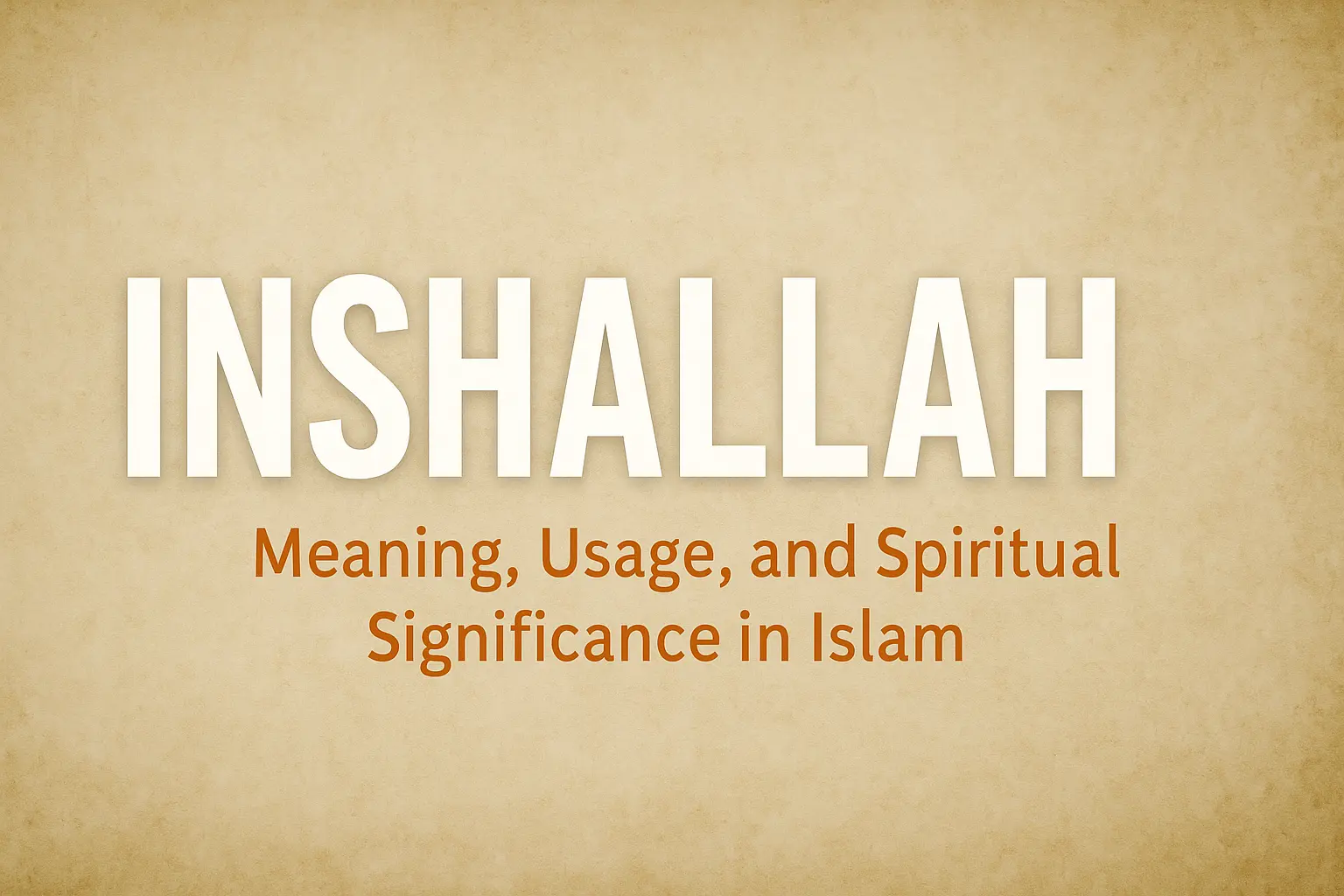InshAllah Meaning, Usage, and Spiritual Significance in Islam
InshaAllah or inshallah is one of the most commonly used phrased in Islamic world. It means If God Will (If Allah wills) regarding something. The phrase Inshallah (إن شاء الله) is used for futuristic purpose, that it will happen if the God wills. Suppose, you are going to tell someone that you are going to do something or going somewhere, and you say InshaAllah with it, it means that you believe it will happen if Allah will, like I am going to beach on weekend Inshallah, then it means that you believe you would only be able to go if the Lord wills else you cant or you wont be able to. The phrase refers to the firm
faith of Muslims that everything happens by the ultimate authority of Allah as it is said “Inna allaha ala kulli shay’in qadeer” (إِنَّ اللَّهَ عَلَىٰ كُلِّ شَيْءٍ قَدِيرٌ), a famous verse from the Quran that means “Indeed, Allah is capable of doing everything” or “Surely Allah is Most Capable of everything”. This well-known Quranic verse emphasizes the omnipotence of Allah, stating that He has absolute power and control over all aspects of existence and creation. So, by using Insha’Allah, it simply means that you put your firm faith in the creator of universe. This term is used globally by all Muslims in daily conversation and its importance as an utmost expression of faith. You actually make God witness in matters and also shows that you remember him in everything.
Etymology and Literal Meaning:
Etymology refers to the study of the origin of words and the way in which their meanings have changed throughout history or what their usual intention is, depending on the context. The Etymology of the said phrase is as such follow but first, we will simply breakdown it for better understanding.
The Breakdown of the phrase in English to Arabic is as such follow.
Arabic: In (if), Sha’a (willed), Allah (God).
Common Languages Break down (English, Arabic, Urdu and Hindi)
- In (إن) – “if” (اگر)
- Sha’a (شاء) – “willed / has willed” (چاہا / ارادہ کیا)
- Allah (الله) – “God” (اللہ)
اکٹھے ملا کر إن شاء الله کا مطلب ہے: “اگر اللہ نے چاہا” ۔
InshaAllah in Hindi
“इंशाल्लाह”
Inshallah in Spanish and Portugues
- Spanish Ojalá
- Portuguese Oxalá When you say it, you pronounce it in sound similar to InshaAllah in Arabic.
So, when you put them together, In Sha’a Allah literally reads as “If God has willed” or more smoothly, “If the God wills.” This shows any future action depends entirely on Allah’s will and not solely on human plans.
In Quran, its occurrence is in Surah Al-Kahf (18:23-24) where Allah instructs believers to say Inshallah when speaking of future plans. The reason behind is that people or humans can only try for something but its success or failure depends on other things or the nature as well. This is why Allah has told the believers to always keep him in mind while making such commitments. The pronunciation variations don’t have much difference as most of the people including the Sub-Continent uses the same phrase as the Arabic so there is no cross cultures variation.
Spiritual and Cultural Significance:
Saying Inshallah holds enormous tawakkul (trust in Allah’s plan) in Muslims lives. They literally use it daily routine and communication in everyday matters, particularly when talking about any future plans or tasks. This thing also illustrate that human power has limitations and Allah has ultimate control over outcomes. It also adds or fosters humility and patience into people which are among the favorite human personality traits for Allah, he likes to see these qualities in his people.
Everyday Usage:
The term is usually applied in daily situations such as planning events, making promises, discussing future goals. It also depends on situations or tones. If used in a Sincere tone, it means the genuine reliance on Allah. Casual or cultural use in some regions to politely decline or express uncertainty that if one is not sure about something, then people often say this, but it should only be said if one has intention to do so because you are making God, a witness to your commitment and
statement, so you should be really careful.
Misconceptions and Etiquette:
It is to clarify that Inshallah is not a way to avoid commitment but to express hope under divine will, it is also important to add or combining of intention, effort, and prayer with the phrase. It’s a gentle reminder for respected readers that saying it with sincerity is key.
The phrase “InshAllah”, meaning “If God wills”, is more than just a cultural expression. it’s a powerful reminder of faith and surrender to Allah’s plan. It’s a phrase used daily by millions of Muslims around the world to express hope, patience, and trust in divine timing. For those seeking to understand such deep Islamic concepts on a deeper level, enrolling in one of the best online Quran classes can be a life-changing step. These courses not only teach the Quran with proper Tajweed but also help students grasp the spiritual meanings behind commonly used phrases like “InshAllah”, allowing them to connect more deeply with their faith in both words and practice.
Conclusion:
The phrase is highly valued in Islamic culture and it constantly reminds, directly or indirectly, intentionally or unintentionally about God’s sovereignty and human
dependence on divine will. It shows that everything is by the God’s will and one should have firm faith and not even a slightest of doubt regarding it. Saying it with pure intention is justification for your faith but if you don’t have intention to do something, yet you say it, then you are committing a horrible sin and you should avoid it. Dear, Readers, we highly encourage you to use “Inshallah” mindfully, with both faith and action.
Thankyou!
May Allah keep us on the right path. Aameen!







